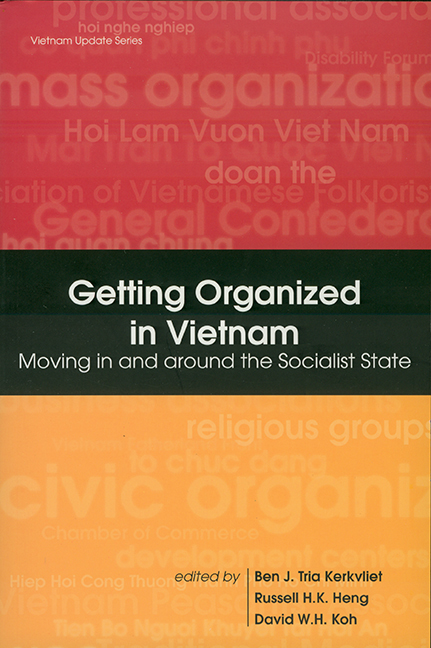Book contents
- Frontmatter
- Contents
- Preface
- Abbreviations
- Introduction: Grappling with Organizations and the State in Contemporary Vietnam
- 1 From Fence-Breaking to Networking: Interests, Popular Organizations, and Policy Influences in Post-Socialist Vietnam
- 2 Business Associations and Policy-Making in Vietnam
- 3 NGOs and Highland Development: A Case Study in Crafting New Roles
- 4 The Disabled and Their Organizations: The Emergence of New Paradigms
- 5 Authoritarian Governance and Labour: The VGCL and the Party-State in Economic Renovation
- 6 The Relationship between Civic and Governmental Organizations in Vietnam: Selected Findings
- 7 Donors, Local Development Groups and Institutional Reform over Vietnam's Development Decade
- Index
- About the Contributors
7 - Donors, Local Development Groups and Institutional Reform over Vietnam's Development Decade
Published online by Cambridge University Press: 21 October 2015
- Frontmatter
- Contents
- Preface
- Abbreviations
- Introduction: Grappling with Organizations and the State in Contemporary Vietnam
- 1 From Fence-Breaking to Networking: Interests, Popular Organizations, and Policy Influences in Post-Socialist Vietnam
- 2 Business Associations and Policy-Making in Vietnam
- 3 NGOs and Highland Development: A Case Study in Crafting New Roles
- 4 The Disabled and Their Organizations: The Emergence of New Paradigms
- 5 Authoritarian Governance and Labour: The VGCL and the Party-State in Economic Renovation
- 6 The Relationship between Civic and Governmental Organizations in Vietnam: Selected Findings
- 7 Donors, Local Development Groups and Institutional Reform over Vietnam's Development Decade
- Index
- About the Contributors
Summary
International donors have attempted to contribute to, and indeed influence, the overall tenor of socioeconomic and governance-related reforms in Vietnam. They have done so in a number of ways: directly supporting policy research, establishing forums for debate of developmental issues with government counterparts, funding projects on administrative and legal reform and central level capacity building, and providing direct financial and sometimes indirect support for “indigenous” NGOs, primarily development service organizations working as contractors for particular development projects.
This chapter examines another modality through which donors sought to influence administrative reform over the heady “development decade” of the 1990s—donor support for rural development projects conceived as “policy experiments” (Rondinelli 1983). Though diverse in sectoral focus, these projects commonly attempted to introduce local institutional arrangements that promote greater responsiveness and accountability of local governments to rural communities as a whole, or to particular sub-groups such as smallholder farmers. To do so, local organizations or grassroots groups were typically established as new ways of organizing the rural populace to demand, plan for, access, or provide services underpinning rural development and poverty alleviation. “Local development groups” (LDGs) is the name I give to groups comprised of farmers and other end-users of project services (or representatives they choose) that were formed in the process of implementing particular development projects.
This chapter probes the experience of these development projects and LDGs over approximately the last ten years. It depicts how projects funded by a wide range of donors became an important part of the institutional landscape in many areas of Vietnam, leaving a significant mark on many sectors related to rural development. Five sections follow this introduction. The first examines how changing donor roles interacted with institutional developments to produce an opportunity for projects to influence policy. Section two presents a theoretical framework with which to assess LDGs and the policy experiments in which they were embedded. Section three applies the framework to a sample of 15 donor projects operational over the 1990s in Vietnam.
- Type
- Chapter
- Information
- Getting Organized in VietnamMoving in and around the Socialist State, pp. 234 - 270Publisher: ISEAS–Yusof Ishak InstitutePrint publication year: 2003

